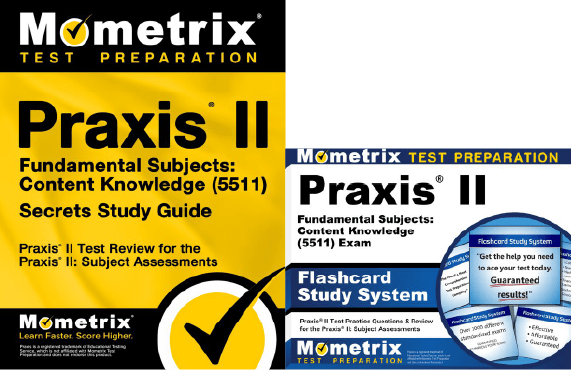If you need help studying for the Praxis® Fundamental Subjects: Content Knowledge test or just want some more information about what the test is like, you’ve come to the right place!
Click below to take a free Praxis Fundamental Subjects practice test!
What’s on the Exam?
First, let’s talk about the questions on the Praxis Fundamental Subjects test. There are 120 selected-response questions in total, with some being numeric entry.
Selected-response questions can appear in several different forms:
- Single-selection multiple-choice
- Selecting ALL correct answers from a list of choices
- Selecting the correct answer from a drop-down menu
- Clicking parts of a graphic such as a map or a chart
- Dragging and dropping answers into a targeted area on the screen
Numeric Entry
Numeric entry questions involve entering numbers into answer boxes, rather than selecting an answer out of multiple choices.
Let’s take a closer look at the different sections of the Praxis Fundamental Subjects test:
1. English Language Arts
30 questions
Reading Literature
- Literal and nonliteral meanings of literary texts
- Major themes and purposes
- Relationships among particular elements in a text
- Historical and cross-cultural contexts
- Comparisons between texts
Literary Methods and Effects
- Point of view
- Setting
- Tone
- Mood
- Character
- Imagery
- Figurative language
Reading and Communication Skills
- Identifying the main idea and supporting details
- Summarizing and paraphrasing text
- The meanings of words as they are used in context
- Text organization
- Making inferences and conclusions
- Writing purposes
- How language is adjusted to communicate with different people
- Decisions about the writing process
2. Mathematics
30 questions
Number Sense and Basic Algebra
- Rational numbers
- Estimation skills
- Percents
- Ratios
- Simplification
- Expressing word problems in algebraic form
- Representing numbers in equivalent forms
- Place-value concepts
Geometry and Measurement
- Converting, selecting, and using measurements
- Using scale measurements
- Area
- Perimeter
- Circumference
- Volume
- Rates
Data Analysis and Probability
- Interpreting data from graphs and charts
- Finding trends and patterns
- Mean, median, mode, and range
- Probability
3. Citizenship and Social Science
30 questions
Historical Continuity and Change
- Chronological thinking skills
- Fact vs. opinion
- Understanding multiple points of view
- The significance of historical artifacts
- he impacts of individuals, groups, and movements on history
- Social, political, economic, and military events
People, Places, and Geographic Regions
- The interaction between people and places
- Using basic geographic literacy skills
Civics and Government
- Major systems of government
- The rights and responsibilities of US citizens
Scarcity and Economic Choice
- The economic factors and principles hat affect individuals, institutions, nations, and events
- The interaction of economic factors with other factors
4. Science
30 questions
Nature of History and Science
- Common methods and tools used to gather data
- Elements of scientific inquiry
- Important scientific developments and contributions
- Drawing conclusions from scientific data
Basic Principles and Fundamentals of Science
- Basic physics concepts
- Energy relationships and transformations
- Basic chemistry concepts
- Basic biological concepts
- Basic ecological concepts
- Basic earth and space science concepts
Science, Technology, and Social Perspectives
- The impact of science and technology on the environment and human affairs
- The impact of science on public health issues
- The role of science and technology in the management of natural resources
- The role of science and technology in the production of energy
How to Register
To register for the test, you’ll need to create an account on the ETS website. Once your account has been created, you can submit your application to take the test.
When you submit your registration, you will need to pay the $130 testing fee.
The good news is that you might be able to get a fee waiver, if you meet ALL of these requirements:
- You are receiving financial aid
- You are an enrolled undergraduate or graduate student
- You can provide a current FAFSA Student Aid Report that shows an Expected Family Contribution (EFC) of $3,000 or less
- You are required to take the test by an authorized score recipient
Praxis Scores
The Praxis Fundamental Subjects test is scored using a scaled scoring method. Here’s how it works:
For every question you answer correctly, you get one point added to your raw score. At the end of the test, your final raw score will be converted to a scaled score. This scaled score will range somewhere between 100 and 200.
The reason your raw score is converted to a scaled score is because everyone that takes the test is given a slightly different set of questions. Since everyone has a different arrangement of questions, and because some questions are harder than others, converting your raw score to a scaled score ensures a more even playing field.
Receiving Your Score
When you receive your skill report, it will tell you how many questions you missed in each section and generally whether you passed or not.
Your scores will become available on your Praxis account on the score reporting date. When you get the score back depends on the testing date.
FAQs
How many questions are on the Praxis Fundamental Subjects exam?
The exam contains 120 questions.
What is the time limit for the Praxis Fundamental Subjects exam?
The exam is timed at 2 hours.
What is the passing score for the Praxis Fundamental Subjects exam?
You’ll need to get a final scaled score of 142-150 depending on the state.
How much does the Praxis Fundamental Subjects exam cost?
The testing fee is $130.
Praxis is a registered trademark of Educational Testing Service, which is not affiliated with Mometrix Test Preparation and does not endorse this page.



 Praxis Study Guide
Praxis Study Guide Praxis Flashcards
Praxis Flashcards